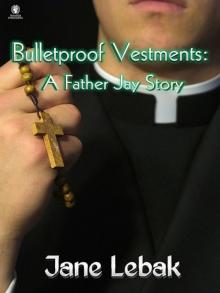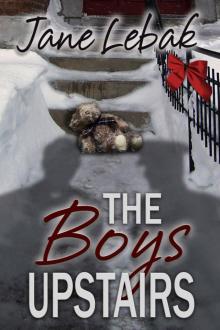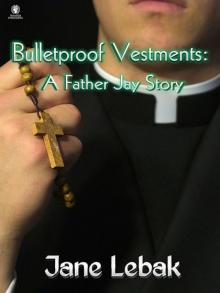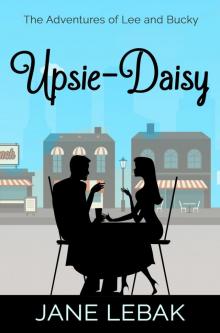- Home
- Jane Lebak
Pickup Notes Page 22
Pickup Notes Read online
Page 22
Shreya shook her head. “That’s a different story.”
I said, “You’re confusing me, then. What did you really want?”
She said, “I wanted to make people into more-than-people, strangers into friends. I…” It sounded like a block. “I wanted to give people something to care about together. A vision of something better.”
She lost her words altogether at that moment, but I knew what she meant. Hadn’t I felt that same impulse with my grandfather? Me with a lifeline-shaped scar and a viola like touching fire, her with a violin that could turn pedestrians into an audience and Fifth Avenue into a concert hall?
Eventually I said, “I still think it’s pretty cool how you trained yourself. Six-year-old Mozart was right. You don’t need lessons to play second violin.”
Her eyes flared. “Like hell you don’t!” But then she saw I was laughing, and she joined me. “Yeah, and you don’t need any to play the viola, either.”
I grinned. “Only two lessons. One on how to sit in the back, and one on how to play all the wrong notes.”
Shortly after he dumped me, Harrison told me to come to Carnegie Hall for the Emerson String Quartet. I was stupid: I wondered if he’d decided professionals could fall in love, and I hadn’t decided whether I’d say ‘yes’ or ‘fuck you.’ When I found Peter and Josh waiting, that answered me: business. Once again I’d been filed to the back of someone’s life like an old receipt.
Harrison had reserved seats close to the front, sub-optimal from an acoustics perspective but ideal for scrutinizing how you perform when you’re the best of the best. Watch the way they cue each other, he said, and the way they adjust mid-play. During intermission and then for an hour at a Starbucks afterward, we combined observations and planned our tactics.
Over the next two years, we heard twenty-five string quartets, many of them free performances. We’d gone as critics and returned with data. Needing mentors, instead we found examples.
By now, I was a damn good analyst, so I analyzed Peter’s play.
Winter Branches was a youngish Broadway musical which got great reviews and languished on the vine. You can describe the storyline of most musicals in one sentence, and you leave the theater humming the final chorus. Not this one. The plot was complex, and the powerful ending had an undercurrent of sadness.
In other words, it wouldn’t have enough word-of-mouth to sell out for five years running. Not even five weeks. You’d dwell on the story all the way home, but you’d never call your friends to say, “Hey, you’ve got to see this!” Peter would be looking for work in a month.
Keeping my verdict to myself, I accompanied Josh backstage to meet thirty musicians. The music director adored Josh, handing over his card with “Look me up!” By contrast, his eyes glazed when I said I played viola, the vegetable on the orchestral buffet. You kind of need it, but why go out of your way to get one?
Peter brought us to a glorified deli that hadn’t made Harrison’s list. Josh seemed a little off-balance, but at least it didn’t look like a date.
“The music for these things isn’t all that tough,” Peter said. “I practice a lot so I don’t lose my edge.”
“You could start your own chamber music group,” I said.
He shook his head, and I felt storm clouds: a topic to avoid.
Josh looked the waiter right in the eye and stuttered while ordering, and I braced myself in case anyone snickered, but no one did. The one getting attention was me. When I looked up, I found the waiter staring down the front of my shirt. I had to tell him twice to put oregano on my sandwich.
Peter turned to Josh as the waiter left. “What happened to you? You’re totally different.”
Josh said, “H-h-how?”
“You don’t wear that baseball cap like you’re being dive-bombed by pigeons. And you used to point to the menu or ask for whatever someone else had.”
Josh said, “I’d had en-n-n—”
“Enough,” Peter said, “right, but it’s like how you talk isn’t a big deal anymore, and that’s cool.”
I adjusted my shirt so the waiter would have a harder time getting his thrills.
Josh shrugged. “It’s st-still a big deal, but I’m not letting it st-stop me from getting what I ...want.”
Peter laughed. “Good for you!”
Josh averted his eyes. “It’s tough, though.”
Peter turned to me. “And now your turn.”
My head snapped up. Did he know what I’d done eight years ago? My turn? “For what?”
He raised his eyebrows. “Don’t panic. Just tell the waiter to shove off.” He leaned forward. “Or should Josh do it, since he’s all empowered and stuff?”
I struggled to regain my composure. “You want me to make a scene?”
“Why should that dude treat you like his personal peep show?” Peter grinned, and Josh flushed.
I unwrapped my silverware from the paper napkin. “So when he brings the food, I should stick my fork in his eye?”
Josh laughed out loud. “It’d st-stop him from doo—”
“Doing it again,” Peter said. “Yeah.”
Josh turned to him. “Knock it off.”
Peter stiffened.
Josh looked away. “Quit finishing my sentences. I can finish them m-myself.”
The look on Peter’s face made me flinch and laugh simultaneously. Peter gestured to our companion. “Case in point. But he did it without putting a fork in my throat.” He turned back to Josh. “Sorry, man. That wasn’t cool.”
Peter had done that for an entire year straight. Josh had never objected.
When the waiter tried again to help himself to the view, I clasped my hands under my chin, forearms blocking my chest, and met his eyes with my stray cat’s territorial stare. For a moment the guy didn’t even set down the plates, and as soon as he did, he left.
“Oh, poor thing,” I murmured. That worked better than I expected. “He forgot to say we should enjoy our meal.”
“No one better want dessert,” Josh replied in a voice equally low.
Peter shot me a grin. “Remind me not to piss you off.”
As predicted, the waiter didn’t give a drive-by to ask if everything was okay, and with empty plates we sat while he failed to bring a check. Big deal. He only punished himself by not turning over the table. Finally we put on coats, and then the waiter appeared.
On the street, Peter told us to keep in touch, as if he hadn’t been the one who disappeared. He shook hands with Josh and then gave me a hug.
I kept my eyes closed against his wool coat, forehead to his shoulder, wishing my friends didn’t all have to leave and that somehow we could have a string quartet with three violins. But then he vanished into his theater, Josh went to meet his father, and I returned to Brooklyn.
TWENTY
In mid-April, Harrison dropped a bomb. “We’re having a baby shower!”
I was barely in the door, Shreya still in the hallway, and I couldn’t step further for wondering whom Harrison had knocked up.
Josh was already on the couch, looking pleased. I choked out, “What?”
“Sunday!” Harrison glowed. “I arranged things with the hostess about five minutes ago. We’ll play for two hours. It’s at a restaurant in—”
“Hold on.” My brain spun as I sorted the information. Okay, not Harrison’s baby, but still chaos-making. I got inside, and Shreya followed. “There’s no time in the schedule.”
“With all due respect,” Harrison replied, leaning against the kitchen counter, “fuck the schedule. This is a paying gig. I don’t remember your calendar cutting us a check.”
I folded my arms. “We have a schedule, just to remind you, to keep from cramming in so much that we sound like idiots.”
Shreya’s voice cut through mine. “What do they want us to play?”
“Mozart. Lots and lots of Mozart. Only Mozart.”
Josh echoed my thought before I even said it: “Mozart has gr-gr-groupies?”
&n
bsp; Harrison nodded. “Among the infant demographic.”
Shreya set her violin on the couch. “Some scientist said babies who listen to Mozart have higher IQs.”
Harrison looked me dead in the eye. “Must be why I’m so stupid. Mom loved Beethoven.”
I slammed the closet door.
Shreya said, “So we won’t play ‘Take Good Care of My Baby’?”
Harrison nodded. “Or ‘Baby Hold Onto Me.’”
Josh said, “She Must Be Somebody’s Baby.”
“Don’t Worry Baby,” Shreya added solemnly.
Harrison breathed, “That is so deep.”
“Look.” I raised my well-creased schedule. “We’re done recording, but we needed that day.”
“We’ll burn the midnight oil.” Harrison got our instruments from the closet. “It’s what, four quartets?”
Shreya said, “Not even that many if they play games.”
Harrison did a double-take. “Games? What kind?”
“Stupid games. That’s what they do at a baby shower. Plus gifts and maybe a craft.”
Harrison looked at me, horrified. “You won’t have one of those for our kids, right?”
“No, because for the five hundredth time, I’m not marrying you.” I took a seat. “If you’re dead set on this, we might as well get to work. I’ll rearrange the schedule later.”
“I love your upbeat enthusiasm.” Harrison sighed. “Schedule enough time to cash the check.”
But then a miracle occurred. For the Mozart, Harrison was a gem. Comment at the end of the third movement was, “Sweet!” and not, “Fifteen measures ago, you were sharp on the B. Let’s do the whole thing over.”
So although I wanted Harrison’s head on a pike, for five days the music became a joy again. I looked forward to practice, as one per day we reviewed quartets for the Mozart-ensmartened baby, and afterward we practiced the festival playlist.
On Sunday, we showed up to a medium-sized function room at a Kew Gardens club where servers were straightening tables and arranging bouquets. The airy room had music stands in a corner. Two violins, a viola, and a cello could make a lot of noise, but the carpeting and table linens would absorb most of it.
Guessing from the decorations, Mom expected twins, one of each variety.
Harrison leaned toward me and Shreya, whispering, “I didn’t realize ‘rhyme disease’ had spread to baby showers,” and he pointed to the opposite wall.
“Rhyme disease” had been discovered by Doctor Harrison Archer when he’d requested clients send an invitation for our scrapbook. It seemed like a good idea until we realized half the couples included a shakedown for gifts right on the invitation. It was our fifth client whose invitation broke the camel’s back. Harrison had shoved it into my hand right at his door, saying, “I just learned it ennobles greed when you say it with poetry. Check it out.”
After Mr. and Mrs. Whatever requested the honor of your presence, was this gem:
Boxes and ribbons have plenty of flash,
But save all the trouble, and just gift us cash.
And before Harrison would play anything that day, he required me to change our client contract so it requested the program instead of the invitation.
Now Harrison pointed to three tables with signs. I couldn’t read the first or the third, but the second faced me.
Think of a tip, good or bad
On how to be the best Mommy or Dad.
Please share your wisdom, but leave off your name
And then we’ll play a guessing game!
Rhyme disease at its finest.
Shreya didn’t respond. Actually, she looked sad. I said, “Hey, you okay?”
She looked up. “Huh?” Then, “Oh, I just never understood the point of showers.” She forced a smile. “It seems like they should have it after the kid’s born, to be sure everything’s okay.”
Harrison snorted. “That’s grim.”
Shreya stared at her violin as if testing the strings with her eyes. I said, “She’s got a point. And it would save a lot of hassle if the ultrasound was wrong about the sex.”
Harrison shrugged. “That’s why you give gift receipts.”
We were in full Mozartian swing when the Guest of Honor arrived with enough camera flashes to simulate D-Day, and then we played Mozart after Mozart in an attempt to boost the babies’ IQ by as many points as possible in two hours.
After two quartets (and fifty minutes) the guests broke from eating their cream cheese and cucumber sandwiches (no kidding!) to watch the Mom-To-Be open a hefty pile of gifts. Our contract specified fifteen minutes for lunch, so as soon as the servers brought our vendor meals, we clustered around a back table and feasted. The babies were losing their chance to attend Harvard by the second.
We got burgers and fries. Harrison must have been in testosterone withdrawal from all the pastels because he started a fight with Josh about the Yankees.
Choose one: which is the true Yankees fan?
Harrison: This year! This is the year they’ll take it all the way! They’ve got hitting, they’ve got pitching—
Josh: Are you out of your mind? Management sucks, they have no bullpen, and they sunk all their money on a one-year contract for a center-fielder who’s already injured. They might as well pack it in now.
The right answer would be “Josh.” Harrison would cheer for the Mets too. For Josh, there were only two teams: the Yankees and whomever the Yankees played. For two years now I’d watched them engage in the Yankee Fan Dance, with Harrison’s part staying the same year-round, but Josh’s changing with the season. March: This is the year! This year they go all the way! April: They suck! Someone should fire them all and call up a Little League team. June: They had a slow start, but they’re going to pull it out! August: If they win every game from here out, they’ll make it! September: Next year! Next year they’ll take it all the way!
While they argued, a waitress brought us cake. “Would you like anything else?”
Josh said, “Actually, I’d like a c—”
I’m not sure how to describe what happened next, although I could write it in music notation. The cello part is marked “solo” and repeats that C for two million measures while the first violin is at rest and the viola’s part is marked “blush.” The second violin is supporting the cello, with little “nod” marks, while the waitress, who I guess is our audience, stays stock still.
Josh managed to get out “Caa—” before blocking, and then he burst out laughing.
Shreya said, “Should I get you a menu so you can point?” and he laughed even harder.
Harrison looked worried. “I’m not sure if I should be laughing.”
“You mmm-might as well.” Josh grinned. “I’ll try again.”
I tensed in anticipation of the waitress’s disgust, except she maintained a poker face while Josh stammered very hard over, eventually, “Cap-pu-cchi-no,” a word I’d never realized consists entirely of booby-traps for the stuttering brain.
Shreya gave a restrained, “Yay!” and Josh, inexplicably, beamed. “I knew you could do it.”
The waitress bent close. “My cousin stutters.” Then she fled to the kitchen.
Flushed, Josh wore a satisfaction I hadn’t seen in...well, I certainly hadn’t seen it in the first grade cafeteria, where he’d brown-bagged it rather than try telling the lunch lady he wanted a hamburger instead of a hot dog.
Harrison said, “Mind sharing what that was all about?”
“Two words every stu-stutterer has problems with,” Josh said, then paused. “Three. First is that it’s unfair that ‘st-stutter’ begins with S-T. Second is his name. And third—” He looked up, and yeah, that was pride. “Third is ca—”
He blocked again. Shreya broke up in giggles, and I hid behind my hands.
The waitress returned with Josh’s hard-won cappuccino and a coffee pot, from which she refilled everyone else’s.
Harrison glared at her retreating form. “I hate that. I get my coffee wit
h the perfect balance of cream and sugar, and without asking, they refill it right to the very top so I can’t fix it.”
“My God, I’m sorry,” Shreya whispered. “That’s terrible.”
“It’s such a pain. Oh, you’re making fun of me.” I wasn’t sure what tipped him off because Shreya had her hands clasped and so help me, tears in her eyes. Harrison’s eyes crinkled. “Say, Josh, if you want a cappuccino every day, I hear there’s this device.”
Josh’s eyes flashed. “I hear I t-t-t-turned it down, too.”
“Hey, guys!” said an approaching figure.
The only other male in the room averted a fight by introducing himself as the father-to-be, “solely necessary to lure in the mom!” Heavy-set and dressed as if for an afternoon wedding, he smiled easily and often. Perhaps desperate for a testosterone boost, the guy seated himself between Harrison and Josh.
“You guys are awesome.” The dad pulled out his checkbook. “My father-in-law recommended you.”
Antennae up, Harrison said, “Where did he hear us?”
“At his retirement dinner. He said one of you was ready to die.”
Harrison raised a hand guiltily.
The man handed the check to Harrison, who passed it to me. I glanced at it, then handed it back. “You didn’t write in the memo line.”
The guy laughed. “Should I write ‘amazing performance’?”
“You should always write the memo. That way you can prove what it was for.”
The guy grinned. “Would you do that even to your mom?”
I rolled my eyes. “My mom was the one who argued until I had to write two checks for the same thing. So yeah.”
Silence fell around the table with everyone looking uncomfortable, as if someone had farted. Finally the new dad said, “Well, I trust you.”
I pocketed the money. You just can’t save some people from themselves.
Conversation stayed stopped until Harrison realized the guy had checks left. “If you want Mozart, there’s some on our group’s CD.”
The man nodded. “I know. I copied my father-in-law’s,” and Harrison gave a wounded look.
Shreya had been staring distractedly around the room, but now she gestured to the side. “Is that your mother-in-law?”

 Bulletproof Vestments
Bulletproof Vestments The Wrong Enemy
The Wrong Enemy The Boys Upstairs (Father Jay Book 2)
The Boys Upstairs (Father Jay Book 2) Sacred Cups (Seven Archangels Book 2)
Sacred Cups (Seven Archangels Book 2) Bulletproof Vestments: A Father Jay Story
Bulletproof Vestments: A Father Jay Story An Arrow In Flight (Seven Archangels Book 1)
An Arrow In Flight (Seven Archangels Book 1) Upsie-Daisy
Upsie-Daisy Shattered Walls (Seven Archangels Book 3)
Shattered Walls (Seven Archangels Book 3) Pickup Notes
Pickup Notes